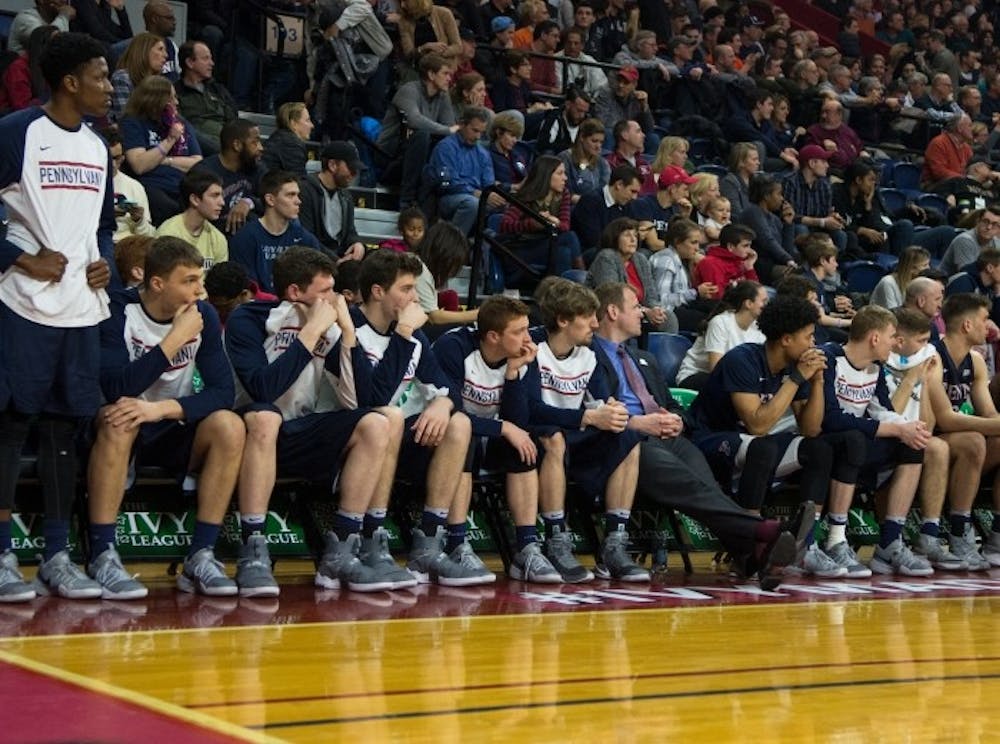
Mental health and preparation have been a focus for Penn men's basketball under coach Steve Donahue's tenure.
Credit: Zach SheldonWhen it comes to Penn Athletics’ approach to mental wellness, the focus is not so much ‘mind over matter,’ but rather ‘mind in harmony with matter.’
“I asked coaches, ‘What percentage of [sports] is mental?’ and they all responded that it’s 35%, 50%, even 80% mental,” Dr. Joel Fish, the official sports psychologist for Penn Ahtletics, recalled. “So, if the game is largely mental, then let’s spend time during the week thinking about the mental part of the game.”
That is exactly what men’s basketball coach Steve Donahue and Dr. Joe Dowling have committed to doing. Dowling primarily works with athletes from both basketball programs to attend to the mental side of the game as well as to help with their mentality throughout everyday life.
“With these kids, it’s so much stress,” Donahue said. “With handling the academics here, and, obviously, what we demand in Division I basketball, to have another adult that’s a professional in dealing with stuff that’s off the court to give them tools they can use not only in basketball, but for the rest of their life, is great."
What makes the partnership of Dowling and Donahue even more effective is how often their careers have intersected. The two initially met at the beginning of each of their respective careers, while Donahue was a volunteer assistant coach for the Quakers. It was then when Donahue started bringing in Dowling talk to his players on an informal basis.
This pattern continued when Donahue went on to work for the basketball programs at Cornell and Boston College. When Donahue returned to Penn basketball in a more substantial capacity, so too did Dowling, as he became the primary counseling resource for both basketball programs.
Dowling's incentive remains the same, regardless of whether he's meeting with the teams in team-building exercises or in a one-on-one capacity. He always tries to try prepare the athlete to perform at peak performance.
But what does it actually mean to reach peak performance?
According to Dowling, it begins with an improvement of self-treatment; he challenges his athletes to look up to themselves in the way that they look up to their peers. Secondly, he attends to strengthening an athlete's support system and his or her ability to communicate with coaches, teammates, and family members. Finally, he stresses the importance of pulling positive memories from past performances.
“I’m a therapist first and foremost,” the Villanova graduate said. “I don’t even like the term 'sports psychologist'; there is no accountant psychology, [or] engineering psychology. I like working with athletes, but when I am working with athletes, I help them address whatever comes up.”
In terms of “whatever comes up,” Dowling asserted that it really depends on the individual. While an athlete who is comfortable with things in his or her personal life will only focus on things like basketball, Dowling makes sure to address the things going on outside of the court when he sees fit.
As for the rest of Penn Athletics’ athletes? That’s where Fish comes in.
As the official Penn Athletics sports psychologist, Fish is an accessible resource for all of Penn’s athletic programs, and his credentials only provide further context for his comprehensive approach to sports psychology at Penn. He previously consulted with the 76ers, Phillies and the Flyers. His published work, 101 Ways to Be a Terrific Sports Parent, demonstrates the importance of not only establishing a dialogue with the student athlete but also the importance of educating and communicating with those key members of a student athlete’s support group.
What really stands out is how applicable the mental skills Fish develops with the athletes are in life.
“The goal is to set up a mental skills plan to address an area where they feel like they need improvement,” Fish said. “If a player is struggling with confidence, we set up a mental skills plan with positive self-talk; if it’s pressure performance, maybe we set up a mental skills plan with relaxation.”
Positive self-talk. Relaxation. These are skills that seem imperative to get through collegiate life, let alone life as a college athlete. This is exactly what all three men stressed: how important it is to translate these skills off the field, and how crucial it is for those not competing in Division I athletics to execute these mental skills as well.
Whether dealing with students or student athletes, the lessons pulled from the conversations with Fish, Dowling, and Donahue remain the same: when it comes to self-nourishment and wellness, the mind always matters.
The Daily Pennsylvanian is an independent, student-run newspaper. Please consider making a donation to support the coverage that shapes the University. Your generosity ensures a future of strong journalism at Penn.
Donate




